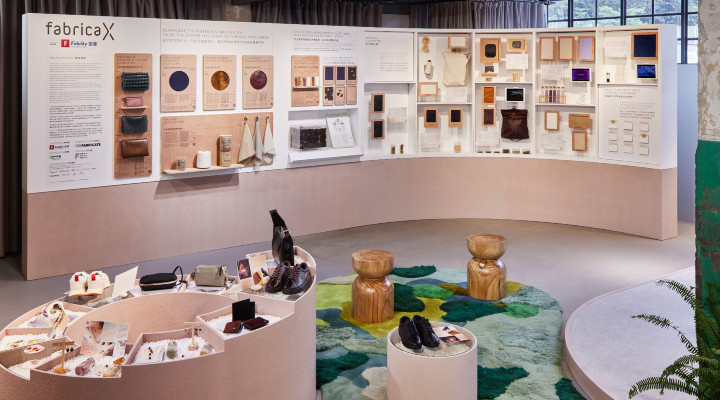Fabrica X, the experiential concept store launched last year by The Mills Fabrica in Hong Kong, has kicked off a new campaign celebrating innovation in biomaterials. Biomaterials are new materials made from organic waste, such as alternative leathers derived from coffee waste and footwear made from wood. The campaign is in line with Fabrica X’s mission to explore different aspects of sustainability through a combination of retail, education and experiences. According to Textile Exchang
xchange’s 2022 report, synthetic fibres represent 65 per cent of global fibre production, and more than half of these fibres, 56 per cent, are derived from fossil fuels.
Because a huge amount of textile waste is sent to landfills or incinerated each year – an estimated one garbage truck every second – synthetic fibres end up being a major contributor to global greenhouse gas emissions.
That is why Fabrica X wants to raise awareness about alternative materials through its six-month campaign around biomaterials.
“Last year saw much more awareness brought to new innovations in textile and apparel, particularly on the sustainability front, so this year we’re already seeing lots of development and effort around bringing these innovations to businesses and consumers,” Cintia Nunes, general manager and head of Asia at The Mills Fabrica, told Inside Retail.
Cintia Nunes, general manager and head of Asia at The Mills Fabrica
Textile dyeing and food waste
According to Nunes, alternative leathers made from coffee waste can serve as substitutes for leather in bags, shoes and accessories, while technical fabrics made from banana plants and sustainable dyes made from sugar can replace toxic and polluting materials in the denim-making process.
These and other insights are on display in the Fabrica X space in Hong Kong.
“Let me paint a picture, when you first walk into Fabrica X, you will be met with our exhibition area where we showcase global brands’ biomaterial concepts, innovation, and fabrics where people can touch, feel and observe the materials,” Nunes said.
Visitors can check out the lifecycle of a piece of biodegradable fabric that decomposes in real time. There is also an experiential zone where they can see first-hand how common food waste is transformed into biomaterials.
“To ensure that our approach is actually effective, we set up measurements for each campaign to see where people’s knowledge and habits stand before and after their experience at Fabrica X,” Nunes said.
The team tweaks and improves each of its campaigns based on these findings to maximise their impact.
While biomaterials offer a promising alternative to the current model, there is still much work to be done to bring these innovations to consumers and businesses – as well as raise awareness of the polluting nature of synthetic fibres.
“However, we’re confident that our approach combining education, experience and retail can be a great step forward,” Nunes said.
The store also has three workshops – one that transforms eggshell waste into accessories; one that recycles food waste into bracelets, whilst supporting Ways Out – a local organisation that serves to empower underprivileged women in Hong Kong.
There is also a book-binding workshop that creates sustainable notebooks with alternative leathers created from coffee ground waste.
The future
According to Nunes, Fabrica X is open to partnerships and collaborations with start-ups, brands, corporations and investors to promote the use of sustainable materials and accelerate the development and adoption of innovative biomaterials.
“For example, our investment includes Colorifix, a biotechnology company that pioneered a biological process to produce, deposit and fix pigments onto textiles. Its synthetic biology approach allows it to entirely cut out harsh chemicals and reduce water consumption,” she noted.
She explained that textile dyeing is one of the most polluting aspects of the textile supply chain, and that conventional dyeing techniques create 200 tonnes of polluted water for every tonne of fabric.
“Compared to the conventional dyeing step for cotton, the Colorifix technology reduces water consumption by at least 49 per cent, electricity by 35 per cent, and CO2 emissions by 31 per cent,” she said.
Nunes revealed that Fabrica X visitors can see how Colorifix works, and that’s why she feels the concept store is important – so consumers can learn, experience, and purchase the latest innovations in sustainability.
In addition to Fabrica X, The Mills Fabrica also runs an investment fund, business incubator, lab, office and event spaces across Hong Kong and London.

